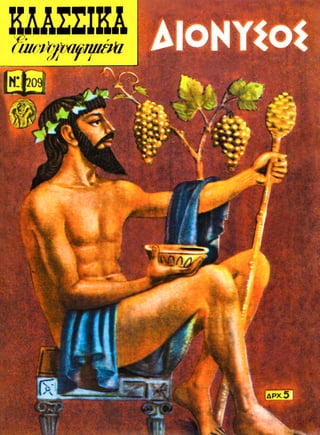1 of 52
Downloaded 11 times




















































Ad
Recommended
Satyrs



Satyrspharos1
ћэ
The document lists various ancient Greek vases from the Archaic period, including their names, artists, dates ranging from around 570 BC to 460 BC, and current locations in museums across Europe. It mentions the Francois Vase by Kleitias from around 570 BC in Florence, various works by the Amasis painter and Douris dating to around 530 BC and 490 BC located in W√Љrzburg, Basel, and the British Museum, and other pieces by the Berlin painter, Makron, Providence painter and Pronomos painter in various European cities between 500 BC to 460 BC.Dionysus presentation



Dionysus presentationCosolargy
ћэ
The document presents an alternative interpretation of the legend of Dionysus that focuses on the spiritual symbolism rather than a superficial view of him as a god of grapes and wine. It explains that Dionysus' birth and rebirth symbolize the death of the physical body and survival of the eternal soul. Symbols associated with Dionysus like the pine cone, ivy, and his travels represent spiritual awakening, connections between all things, and seeking enlightenment by sharing knowledge with others. This interpretation depicts Dionysus not as a god of drunken partying but as a spiritual teacher who achieved enlightenment and sought to teach others.Dionysus slides



Dionysus slidespharos1
ћэ
This document provides descriptions of various ancient Greek vases and other ceramic artifacts from between 580 BC to 420 BC, including their names, artists, dates and locations. The artifacts mentioned include craters, kylikes, amphorae, a stamnos, and a skyphos located in cities such as London, Florence, Munich, Berlin, Paris, Naples and Tarquinia.Dionysus



DionysusTuƒЯ√Іe Karaslan
ћэ
This document provides information about Dionysus, the Greek god of wine, ritual madness, fertility, and theatre. It discusses his character and functions, symbols, love affairs, cult and representations, birth and childhood, and stories. Specifically, it notes that Dionysus was the son of Zeus and Semele, born after Zeus rescued him from his mother's burnt womb. It outlines Dionysus' childhood and upbringing by various figures after being rescued multiple times from Hera. The document also shares stories about Dionysus and pirates and the king Midas.Dionysus Myth Presentation



Dionysus Myth PresentationBarbara Burkhalter
ћэ
Dionysus was the Greek god of wine, agriculture, fertility, and the stage. He was the son of Zeus and the mortal woman Semele. As the god of wine, Dionysus' personality was portrayed as both joyful and cruel, reflecting the dual nature of wine's effects. One story tells of how Dionysus took pity on Ariadne after she was abandoned by Theseus and married her, a rare happy ending among the Olympian gods.5ќњ ѕГќµќЉќєќљќђѕБќєќњ ќїќњќєќЉѕОќЊќµѕЙќљ



5ќњ ѕГќµќЉќєќљќђѕБќєќњ ќїќњќєќЉѕОќЊќµѕЙќљPoillie Vassisoali
ћэ
ќµќєѕГќЈќ≥ќЃѕГќµќєѕВ 5ќњѕЕ ѕГќµќЉќєќљќ±ѕБќѓќњѕЕ ѕАќєќ±ќєќіќєќ±ѕДѕБќєќЇѕОќљ ќїќњќєќЉѕОќЊќµѕЙќљ
ќШќµѕГѕГќ±ќїќњќљќѓќЇќЈ 20024ќњ ѕГќµќЉќєќљќђѕБќєќњ ќїќњќєќЉѕОќЊќµѕЙќљ



4ќњ ѕГќµќЉќєќљќђѕБќєќњ ќїќњќєќЉѕОќЊќµѕЙќљPoillie Vassisoali
ћэ
ќµќєѕГќЈќ≥ќЃѕГќµќєѕВ 4ќњѕЕ ѕГќµќЉќєќљќ±ѕБќѓќњѕЕ ѕАќєќ±ќєќіќєќ±ѕДѕБќєќЇѕОќљ ќїќњќєќЉѕОќЊќµѕЙќљ
ќШќµѕГѕГќ±ќїќњќљќѓќЇќЈ 20013ќњ ѕГќµќЉќєќљќђѕБќєќњ ќїќњќєќЉѕОќЊќµѕЙќљ



3ќњ ѕГќµќЉќєќљќђѕБќєќњ ќїќњќєќЉѕОќЊќµѕЙќљPoillie Vassisoali
ћэ
ќµќєѕГќЈќ≥ќЃѕГќµќєѕВ 3ќњѕЕ ѕГќµќЉќєќљќ±ѕБќѓќњѕЕ ѕАќєќ±ќєќіќєќ±ѕДѕБќєќЇѕОќљ ќїќњќєќЉѕОќЊќµѕЙќљ
ќШќµѕГѕГќ±ќїќњќљќѓќЇќЈ 20002ќњ ѕГќµќЉќєќљќђѕБќєќњ ќїќњќєќЉѕОќЊќµѕЙќљ



2ќњ ѕГќµќЉќєќљќђѕБќєќњ ќїќњќєќЉѕОќЊќµѕЙќљPoillie Vassisoali
ћэ
ќµќєѕГќЈќ≥ќЃѕГќµќєѕВ 2ќњѕЕ ѕГќµќЉќєќљќ±ѕБќѓќњѕЕ ѕАќєќ±ќєќіќєќ±ѕДѕБќєќЇѕОќљ ќїќњќєќЉѕОќЊќµѕЙќљ
ќШќµѕГѕГќ±ќїќњќљќѓќЇќЈ 19991ќњ ѕГќµќЉќєќљќђѕБќєќњ ќїќњќєќЉѕОќЊќµѕЙќљ



1ќњ ѕГќµќЉќєќљќђѕБќєќњ ќїќњќєќЉѕОќЊќµѕЙќљPoillie Vassisoali
ћэ
ќµќєѕГќЈќ≥ќЃѕГќµќєѕВ 1ќњѕЕ ѕГќµќЉќєќљќ±ѕБќѓќњѕЕ ѕАќєќ±ќєќіќєќ±ѕДѕБќєќЇѕОќљ ќїќњќєќЉѕОќЊќµѕЙќљ
ќШќµѕГѕГќ±ќїќњќљќѓќЇќЈ 7.2.1998Installation guide gr ќЯќіќЈќ≥ќѓќµѕВ ќµќ≥ќЇќ±ѕДќђѕГѕДќ±ѕГќЈѕВ



Installation guide gr ќЯќіќЈќ≥ќѓќµѕВ ќµќ≥ќЇќ±ѕДќђѕГѕДќ±ѕГќЈѕВPoillie Vassisoali
ћэ
ќЯќіќЈќ≥ќѓќµѕВ ќµќ≥ќЇќ±ѕДќђѕГѕДќ±ѕГќЈѕВ
ќСѕГѕНѕБќЉќ±ѕДќњ ADSL2+ Router
ZTE ZXV10 W300 v5.2/
ZXV10 W300B v5.2
ќњќїѕЕќЉѕАќєќ±ќЇќ≠ѕВ ќіќєќ±ќіѕБќњќЉќ≠ѕВ



ќњќїѕЕќЉѕАќєќ±ќЇќ≠ѕВ ќіќєќ±ќіѕБќњќЉќ≠ѕВPoillie Vassisoali
ћэ
ќњќїѕЕќЉѕАќєќ±ќЇќ≠ѕВ ќіќєќ±ќіѕБќњќЉќ≠ѕВ
ќФќєќ±ќіѕБќњќЉќ≠ѕВ ѕАќµѕБќѓ ѕДќЈѕВ ќЯќїѕЕќЉѕАќѓќ±ѕВ...ќЈќїќµќєќ±



ќЈќїќµќєќ±Poillie Vassisoali
ћэ
ќЭќЯќЉѕМѕВ ќЧќїќµќѓќ±ѕВ ќЉќµ ѕДќњѕЕѕВ ќіќЃќЉќњѕЕѕВ ќ±ѕАѕМ ѕДќЈќљ ќµѕАќњѕЗќЃ ѕДќњѕЕ ќЪќ±ѕАќњќіќѓѕГѕДѕБќєќ±.
ќЬќЯќЭќСќ£ќ§ќЧќ°ќЩќС ќљќњќЉќњѕН ќЧќЫќХќЩќСќ£



ќЬќЯќЭќСќ£ќ§ќЧќ°ќЩќС ќљќњќЉќњѕН ќЧќЫќХќЩќСќ£Poillie Vassisoali
ћэ
ќЬќЯќЭќСќ£ќ§ќЧќ°ќЩќС ќљќњќЉќњѕН ќЧќЫќХќЩќСќ£rixardos_o_leontokardos_-_the_talisman



rixardos_o_leontokardos_-_the_talismanPoillie Vassisoali
ћэ
ќ°ќєѕЗќђѕБќіќњѕВ ќњ ќїќµќњќљѕДѕМќЇќ±ѕБќіќњѕВMore Related Content
More from Poillie Vassisoali (20)
2ќњ ѕГќµќЉќєќљќђѕБќєќњ ќїќњќєќЉѕОќЊќµѕЙќљ



2ќњ ѕГќµќЉќєќљќђѕБќєќњ ќїќњќєќЉѕОќЊќµѕЙќљPoillie Vassisoali
ћэ
ќµќєѕГќЈќ≥ќЃѕГќµќєѕВ 2ќњѕЕ ѕГќµќЉќєќљќ±ѕБќѓќњѕЕ ѕАќєќ±ќєќіќєќ±ѕДѕБќєќЇѕОќљ ќїќњќєќЉѕОќЊќµѕЙќљ
ќШќµѕГѕГќ±ќїќњќљќѓќЇќЈ 19991ќњ ѕГќµќЉќєќљќђѕБќєќњ ќїќњќєќЉѕОќЊќµѕЙќљ



1ќњ ѕГќµќЉќєќљќђѕБќєќњ ќїќњќєќЉѕОќЊќµѕЙќљPoillie Vassisoali
ћэ
ќµќєѕГќЈќ≥ќЃѕГќµќєѕВ 1ќњѕЕ ѕГќµќЉќєќљќ±ѕБќѓќњѕЕ ѕАќєќ±ќєќіќєќ±ѕДѕБќєќЇѕОќљ ќїќњќєќЉѕОќЊќµѕЙќљ
ќШќµѕГѕГќ±ќїќњќљќѓќЇќЈ 7.2.1998Installation guide gr ќЯќіќЈќ≥ќѓќµѕВ ќµќ≥ќЇќ±ѕДќђѕГѕДќ±ѕГќЈѕВ



Installation guide gr ќЯќіќЈќ≥ќѓќµѕВ ќµќ≥ќЇќ±ѕДќђѕГѕДќ±ѕГќЈѕВPoillie Vassisoali
ћэ
ќЯќіќЈќ≥ќѓќµѕВ ќµќ≥ќЇќ±ѕДќђѕГѕДќ±ѕГќЈѕВ
ќСѕГѕНѕБќЉќ±ѕДќњ ADSL2+ Router
ZTE ZXV10 W300 v5.2/
ZXV10 W300B v5.2
ќњќїѕЕќЉѕАќєќ±ќЇќ≠ѕВ ќіќєќ±ќіѕБќњќЉќ≠ѕВ



ќњќїѕЕќЉѕАќєќ±ќЇќ≠ѕВ ќіќєќ±ќіѕБќњќЉќ≠ѕВPoillie Vassisoali
ћэ
ќњќїѕЕќЉѕАќєќ±ќЇќ≠ѕВ ќіќєќ±ќіѕБќњќЉќ≠ѕВ
ќФќєќ±ќіѕБќњќЉќ≠ѕВ ѕАќµѕБќѓ ѕДќЈѕВ ќЯќїѕЕќЉѕАќѓќ±ѕВ...ќЈќїќµќєќ±



ќЈќїќµќєќ±Poillie Vassisoali
ћэ
ќЭќЯќЉѕМѕВ ќЧќїќµќѓќ±ѕВ ќЉќµ ѕДќњѕЕѕВ ќіќЃќЉќњѕЕѕВ ќ±ѕАѕМ ѕДќЈќљ ќµѕАќњѕЗќЃ ѕДќњѕЕ ќЪќ±ѕАќњќіќѓѕГѕДѕБќєќ±.
ќЬќЯќЭќСќ£ќ§ќЧќ°ќЩќС ќљќњќЉќњѕН ќЧќЫќХќЩќСќ£



ќЬќЯќЭќСќ£ќ§ќЧќ°ќЩќС ќљќњќЉќњѕН ќЧќЫќХќЩќСќ£Poillie Vassisoali
ћэ
ќЬќЯќЭќСќ£ќ§ќЧќ°ќЩќС ќљќњќЉќњѕН ќЧќЫќХќЩќСќ£rixardos_o_leontokardos_-_the_talisman



rixardos_o_leontokardos_-_the_talismanPoillie Vassisoali
ћэ
ќ°ќєѕЗќђѕБќіќњѕВ ќњ ќїќµќњќљѕДѕМќЇќ±ѕБќіќњѕВ












